Retraining Programs for AI Job Loss
scale.jobs
August 29, 2025
AI is reshaping the job market, replacing roles across industries. Workers are turning to retraining programs to gain new skills and secure stable careers. This article highlights key retraining efforts, including affordable online courses, intensive bootcamps, and government support for displaced workers. Here's what you need to know:
- Industries Affected: Manufacturing, customer service, logistics, and even white-collar jobs are seeing automation replace human roles.
- Skills in Demand: Data analytics, IT, cybersecurity, healthcare roles, and skilled trades are growing fields requiring specialized training.
- Top Retraining Programs: Options like Google Career Certificates, Coursera AI/ML courses, Springboard Bootcamps, and BrainStation certifications offer flexible and targeted learning paths.
- Job Search Support: Platforms like scale.jobs help retrained workers with tools like AI-generated resumes, application tracking, and visa assistance.
- Government Assistance: Programs like WIOA and TAA provide funding, training, and career counseling for displaced workers.
Retraining programs combined with job search platforms and federal support offer a clear path for workers navigating challenges in an AI-driven economy.
Reskilling in the Age Of AI | Jorge Tamayo | Leading with AI session
Best Retraining Programs for AI-Displaced Workers
With the rise of AI, many workers are seeking new skills to stay competitive in the job market. Across the U.S., retraining programs are stepping up to the challenge, offering practical pathways into growing industries. Here are some standout programs designed to help AI-displaced workers transition into new careers.
Google Career Certificates
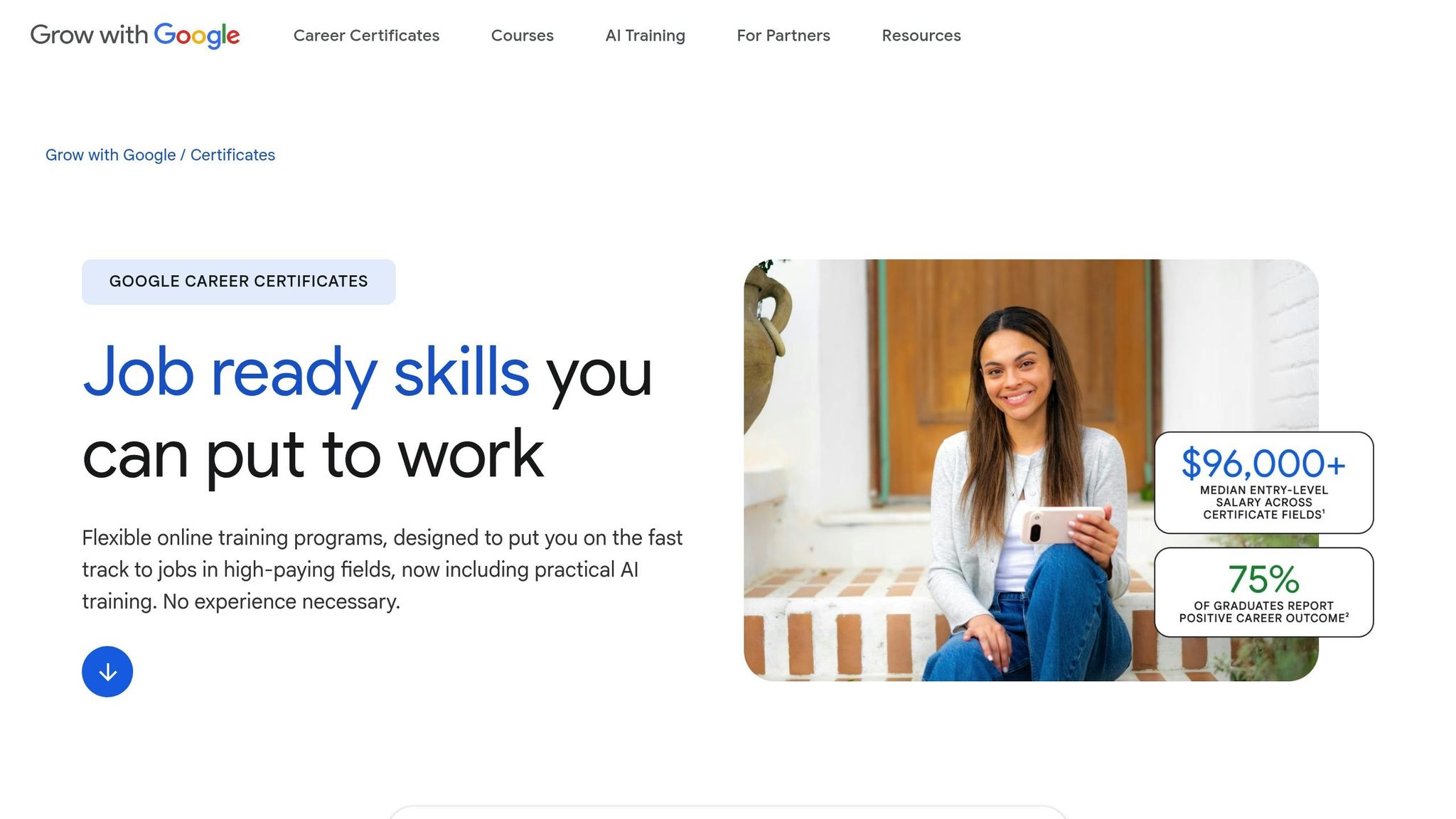
Google Career Certificates are online courses focused on fields like Data Analytics, IT Support, and UX Design. The Data Analytics program teaches participants how to analyze and interpret data using industry-standard tools. The IT Support track equips learners with technical and customer service skills, while the UX Design course covers essentials like design thinking, wireframing, and prototyping. For those who qualify, financial aid and career support services are available, making these programs both accessible and career-focused.
Coursera AI and Machine Learning Specializations
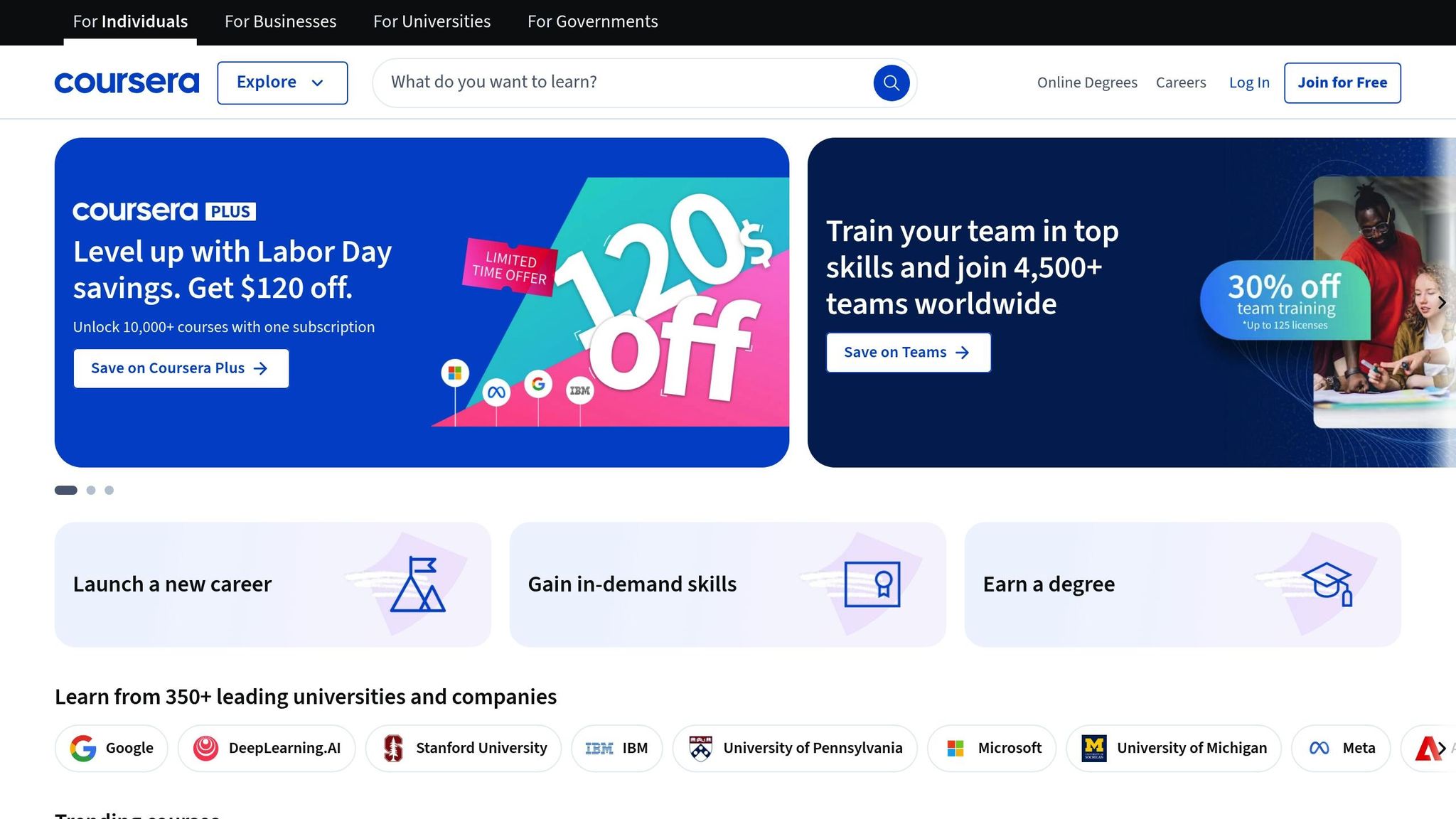
Coursera collaborates with top universities to offer a range of specializations in AI and machine learning. Programs like "AI for Everyone" introduce non-technical users to how AI can be applied in business settings. More advanced courses cover topics such as neural networks, deep learning, and machine learning frameworks. These programs emphasize hands-on learning, using real-world datasets and coding assignments to prepare participants for roles in emerging technologies.
Springboard Machine Learning & AI Bootcamp
Springboard’s bootcamp combines flexible, self-paced learning with personalized mentorship and career coaching. The curriculum includes projects that mimic real-world applications, such as building recommendation systems or working on computer vision tasks. Participants work closely with experienced mentors - data scientists and engineers - while also receiving resume support to ease their career transitions into AI and machine learning roles.
BrainStation's Artificial Intelligence Certification
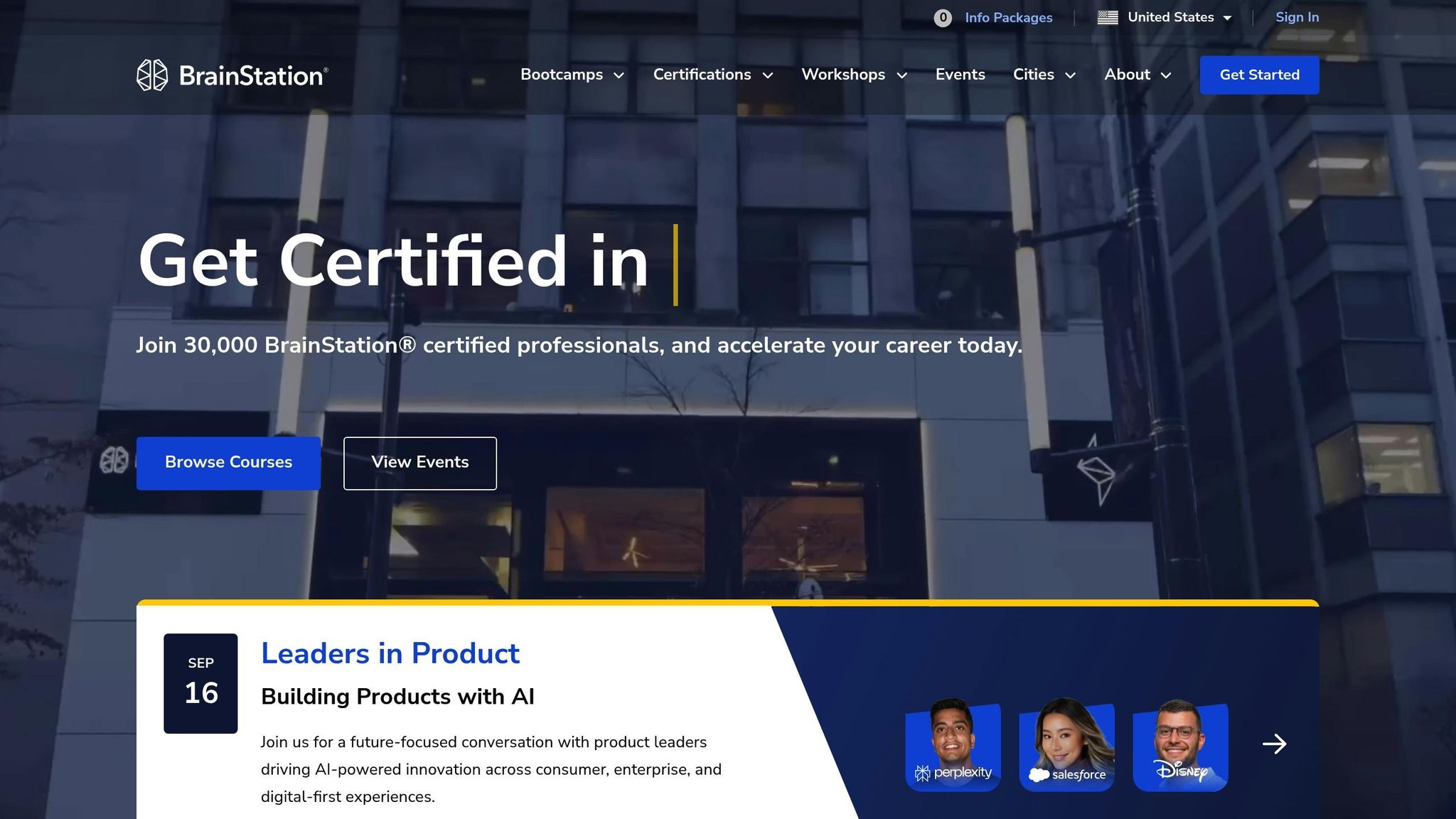
BrainStation offers AI certification courses tailored for working professionals, with options for full-time or part-time schedules. The curriculum dives into Python programming, machine learning basics, deep learning, and AI ethics. Students work on practical projects involving areas like computer vision and natural language processing, gaining hands-on experience. Additionally, BrainStation’s industry connections provide valuable networking opportunities to support job placement.
Big Blue Data Academy Data Science Bootcamp
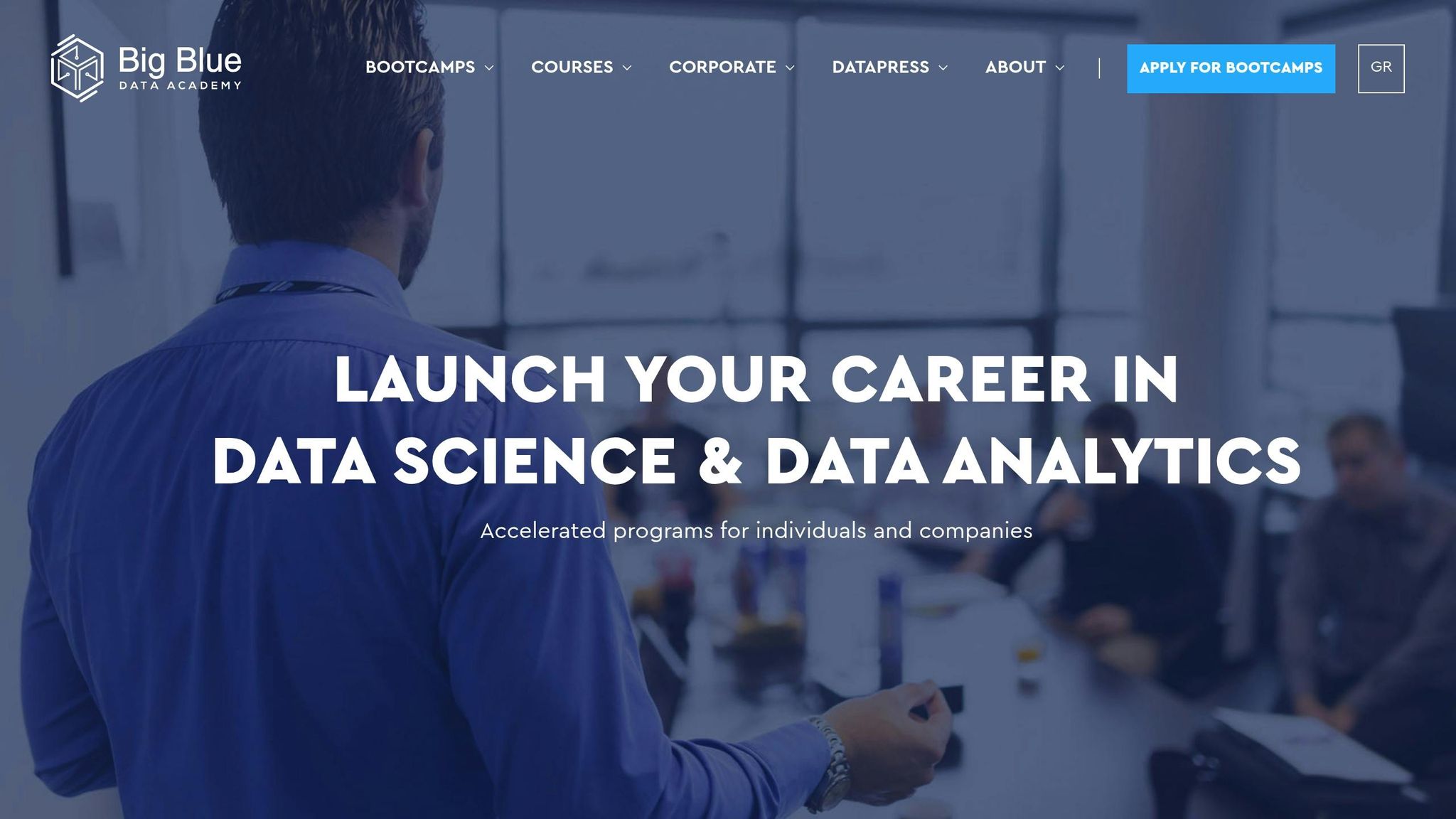
Big Blue Data Academy focuses on helping mid-career professionals pivot into data science roles. This bootcamp combines online learning with in-person workshops, covering topics like statistical analysis, machine learning, data visualization, and business intelligence. Participants can choose specialized tracks in fields such as healthcare, finance, or retail, allowing them to build on their existing expertise while acquiring new technical skills. Flexible financing options, including income share agreements, make the program accessible to a diverse group of learners.
Program Comparison: Cost, Schedule, and Benefits
Program Features Comparison Table
Here's a quick look at the costs, durations, and perks of some of the top retraining programs:
| Program | Cost | Duration | Schedule Options | Main Benefits |
|---|---|---|---|---|
| Google Career Certificates | Subscription-based (varies monthly) | Several months | Self-paced, part-time | Recognized by industry; financial aid available |
| Coursera AI/ML Specializations | Subscription-based (varies monthly per course) | Short-term specializations | Self-paced, part-time | University partnerships; flexible learning options |
| Springboard ML & AI Bootcamp | Premium investment program | Several months | Part-time with mentor support | One-on-one mentorship; job guarantee |
| BrainStation AI Certification | Tiered pricing for part-time or full-time | Short to medium duration | Multiple scheduling options | Networking opportunities; hands-on projects |
| Big Blue Data Academy | Premium investment with flexible financing | Several weeks to months | Hybrid (online and in-person) | Specialized learning tracks; flexible payment plans |
For those looking for affordable entry points, Google Career Certificates stand out. On the other hand, programs like Springboard and Big Blue Data Academy demand a higher financial commitment but come with robust support systems and career-focused services.
If you're juggling work or personal commitments, self-paced programs are a great fit. For those ready to dive in full-time, immersive bootcamps offer a faster track to expertise.
Best Programs for Different Job Seekers
While the table gives a great overview, here’s how these programs align with specific job seeker needs:
- Recent graduates: Programs like Google Career Certificates and Coursera specializations are perfect for building foundational skills at your own pace.
- Mid-career professionals: If you're transitioning into AI-related roles, Springboard and BrainStation offer mentorship and networking opportunities to help you make the leap.
- Immigrant job seekers: BrainStation's industry connections or Big Blue Data Academy's tailored tracks can help you navigate the U.S. job market with confidence.
- Busy individuals: If you have family or other commitments, flexible options like Google Career Certificates or Coursera let you learn on your schedule.
- Budget-conscious learners: Start with affordable programs like Google Career Certificates to explore the tech world without a big upfront commitment. Later, you can decide if a more intensive bootcamp is right for you.
Each program has its strengths, so the best choice depends on your goals, schedule, and budget.
How Job Platforms Like scale.jobs Help Retrained Workers
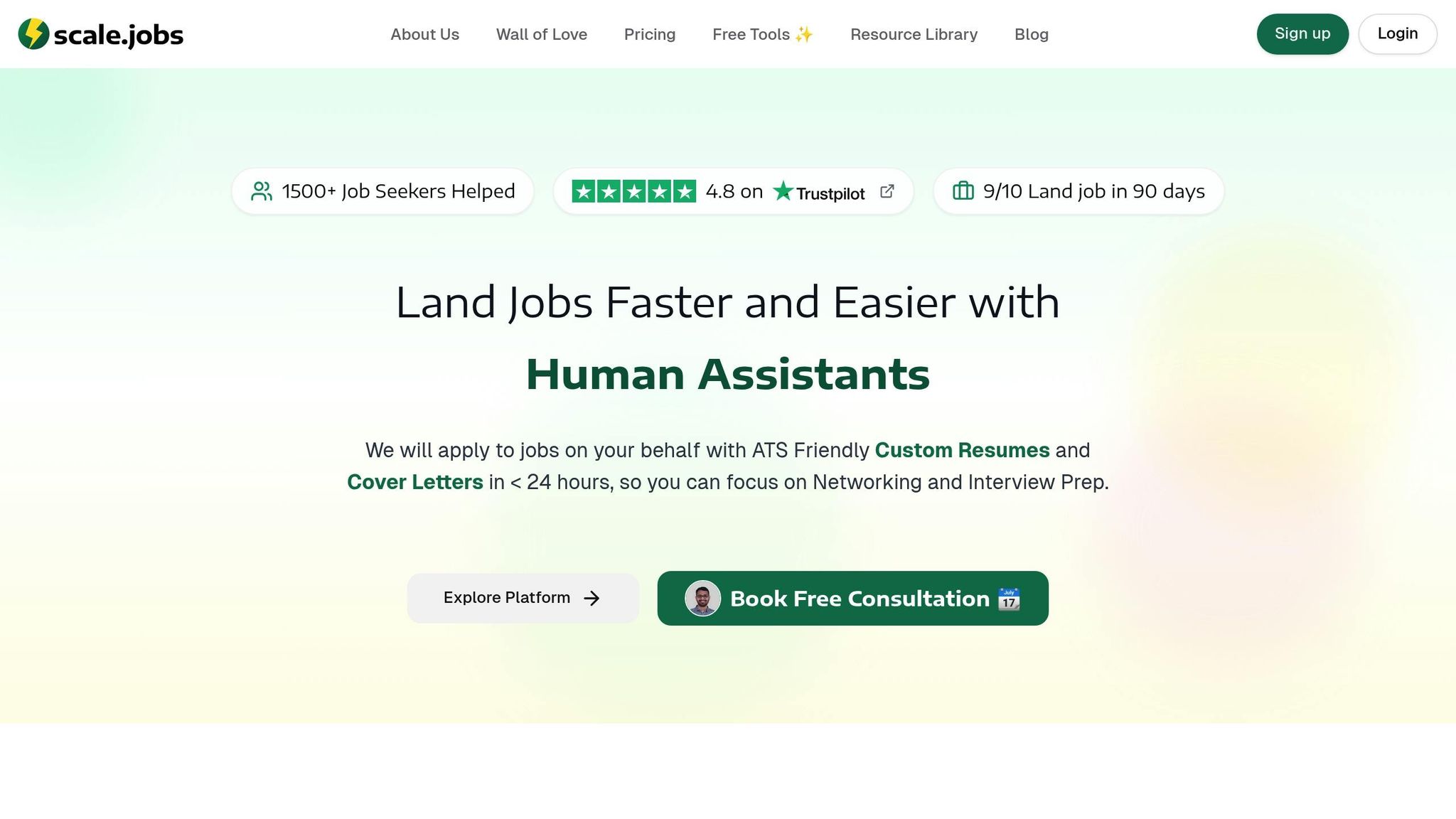
For workers who have completed retraining programs, securing a job is often the next big challenge. That’s where platforms like scale.jobs step in, offering the tools and support needed to bridge the gap between new skills and real job opportunities. With automation reshaping industries, platforms like these are becoming essential for connecting retrained individuals to the right roles.
Traditional job search methods often fall short in addressing the fast-changing dynamics of AI-driven job displacement. Job platforms fill this void by streamlining the application process and matching retrained workers with positions suited to their updated skill sets.
scale.jobs vs. Competitors: What Sets It Apart
Several platforms, including Find My Profession, LazyApply, and TealHQ, provide job search assistance. However, scale.jobs stands out by integrating software, AI, and human support into a single, comprehensive solution. Here’s a quick comparison to highlight its unique offerings:
| Feature | scale.jobs | Find My Profession | LazyApply | TealHQ |
|---|---|---|---|---|
| Human-assisted applications | Yes (Reverse Recruiter) | Yes | No | No |
| AI resume/cover letter tools | Yes | No | Yes | Yes |
| Job application tracking | Yes | No | Yes | Yes |
| Real-time WhatsApp updates | Yes | No | No | No |
| Flat-fee pricing | Yes | No (subscription) | Subscription | Subscription |
| Proof of work screenshots | Yes | No | No | No |
| Visa/immigration support | Yes | No | No | No |
One of the standout features of scale.jobs is its flat-fee pricing model for human-assisted services. Instead of requiring a recurring subscription, users pay a one-time fee with the added benefit of unused credit refunds. This is especially helpful for those navigating financial uncertainty after job loss.
In contrast, Find My Profession relies heavily on human-powered services but operates on a subscription basis, which can quickly add up. LazyApply automates applications but lacks human oversight, increasing the risk of submissions being flagged as spam. TealHQ focuses on organizing and tracking job applications but doesn’t offer the hands-on application help that many retrained workers need.
How scale.jobs Supports Workers Displaced by AI
scale.jobs goes beyond just job matching by addressing the specific hurdles faced by retrained workers. Many of these individuals enter competitive job markets without strong professional networks or experience in crafting applications that pass modern hiring systems. scale.jobs tackles these issues head-on with several targeted features.
For example, the platform includes a free ATS checker, a resume builder, and human assistants who provide real-time updates via WhatsApp and share proof-of-work screenshots. These tools can save users over 20 hours per week on applications. This is especially important because many applicants don’t realize their resumes are filtered out by Applicant Tracking Systems (ATS) before they even reach a recruiter.
For immigrant job seekers, scale.jobs offers tailored support for navigating visa requirements, including H1B, F1, CPT, TN, O1, EB1A, Canada PR, and UK Global Talent Visa processes. The human assistants are well-versed in these complexities, helping users find employers open to sponsorship or specific work authorizations.
Additionally, the platform’s AI Assistant Pro tier, available at $9/month during its launch (regularly $19/month), offers unlimited AI-generated resumes and cover letters. This is a game-changer for workers who need to tailor their applications to various roles as they explore new career paths.
For those on tighter budgets, scale.jobs also provides free tools like salary predictors, interview question generators, and portfolio website creators. These resources lower the barrier for displaced workers who may be financially stretched after completing retraining programs.
With its mix of ATS tools, personalized support, and resources for continuous career growth, scale.jobs is well-suited to help retrained workers navigate the challenges of a rapidly changing job market. Its focus on both immediate job search needs and long-term career development makes it an invaluable ally for those adapting to the realities of AI-driven workplace shifts.
Government Support for Displaced Workers in the United States
While platforms like scale.jobs provide retrained workers with tools to navigate the job market, federal programs add another layer of support by offering financial aid and training opportunities. The U.S. government views job displacement caused by AI and automation as a pressing economic issue. To address this, it offers programs that help workers transition into new careers through financial assistance, retraining initiatives, and career services. These resources are available nationwide through a network of American Job Centers, also known as One-Stop Career Centers.
Workforce Innovation and Opportunity Act (WIOA)
The Workforce Innovation and Opportunity Act (WIOA), enacted in 2014, is the federal government’s flagship program for funding job training and career services for displaced workers. For those impacted by technological advancements, the Dislocated Worker program under WIOA provides training vouchers and career counseling. Eligibility typically hinges on job loss - whether due to layoffs, termination, or a career shift - and does not require a specific period of unemployment.
Participants in WIOA programs receive not only career counseling but also access to supportive services such as childcare, transportation assistance, and financial planning. Many states have streamlined WIOA services by integrating them with online platforms, enabling participants to monitor their progress and access additional resources conveniently.
While WIOA broadly supports displaced workers, the Trade Adjustment Assistance (TAA) program focuses specifically on those affected by trade and automation.
Trade Adjustment Assistance (TAA)
The Trade Adjustment Assistance (TAA) program is tailored to workers whose job losses are tied to shifts in trade or automation. TAA extends income support to participants enrolled in approved training programs and offers benefits like Trade Readjustment Allowances, which provide unemployment assistance beyond standard benefits. The program also covers the full cost of qualifying training, allowing workers to pursue intensive bootcamps or certification courses. Additionally, it may reimburse job search and relocation expenses.
Eligibility for TAA requires proof that the job loss was trade-related. Workers typically file a petition through their state workforce agency, and the Department of Labor evaluates the claim before issuing certification based on specific criteria.
Both WIOA and TAA have adapted to address the complex causes of modern job displacement, including the combined effects of technological advances, trade shifts, and automation. State-level programs often complement these federal initiatives, offering localized assistance through training panels and scholarships in fields where demand for skilled workers is high.
Conclusion: Supporting Workers Through Retraining
Pairing retraining programs with modern job platforms creates a sturdy safety net for workers impacted by AI-driven changes. Initiatives like Google Career Certificates and Springboard bootcamps equip individuals with sought-after skills, but turning those skills into actual employment remains a tough hurdle.
Even with solid retraining, many workers face challenges in securing roles that match their new qualifications. That’s where platforms like scale.jobs step in, offering more than just job listings. Unlike competitors such as LazyApply and Simplify, scale.jobs sets itself apart in several key ways:
- Expert Assistance: Human professionals craft ATS-friendly resumes and personalized cover letters, showcasing transferable skills and new certifications effectively.
- Upfront Pricing: A flat-rate model eliminates the need for ongoing subscriptions, making it a budget-friendly choice for job seekers.
- Clear Communication: Real-time updates via WhatsApp and proof-of-work screenshots ensure transparency and allow users to track their job search progress with ease.
While platforms like scale.jobs innovate job placement, federal programs provide a different type of assistance. Programs such as WIOA and TAA offer financial aid but fall short in addressing job placement directly. scale.jobs bridges this gap by delivering the tools and hands-on support needed to navigate today’s competitive job market.
This combination of retraining and personalized job placement support forms a complete pathway for workers navigating an AI-transformed economy. By aligning high-quality skill development with human-powered job search assistance, displaced workers can access the opportunities they need to thrive.
FAQs
What financial support is available for workers retraining after losing jobs to AI or automation?
Workers in the U.S. facing job displacement due to AI or automation can access various forms of financial aid and support. The Department of Labor offers resources like the Trade Adjustment Assistance (TAA) program, which provides income assistance, career retraining opportunities, and job search tools to help affected individuals transition into new roles.
For those looking to fund retraining, tax-advantaged savings accounts, such as 529 plans, can also be utilized to offset education and skill development costs.
Additionally, new solutions are being explored, including AI displacement insurance and specialized certification programs designed for roles at higher risk of automation. These initiatives focus on preparing workers for emerging, in-demand industries while alleviating the financial strain that often comes with career changes.
How can platforms like scale.jobs help retrained workers find jobs in an AI-driven job market?
Platforms like scale.jobs are stepping up to help retrained workers navigate the challenges of finding jobs in an AI-driven economy. What sets scale.jobs apart is its unique combination of cutting-edge software, AI tools, and human expertise, creating a more efficient and personalized job search experience.
With the help of trained human virtual assistants and reverse recruiters, the platform handles crucial tasks like crafting ATS-friendly resumes, writing custom cover letters, and ensuring applications are submitted on time. This hands-on assistance often leads to faster results, with many users landing jobs in just a few months.
What’s more, scale.jobs keeps things simple and transparent. Users benefit from real-time WhatsApp updates, clear proof-of-work, and a flat-fee pricing model - no hidden costs or recurring fees. This allows job seekers to focus their energy on networking and interview preparation. For those affected by automation, scale.jobs offers a practical and supportive way to get back into the workforce.
What are the best retraining programs for mid-career professionals transitioning to AI-related jobs?
For professionals aiming to shift their careers toward AI, there are several excellent retraining paths available. For instance, Techademy's AI/ML Career Transition Program offers a 36-week live training course that includes hands-on projects and interview preparation. This program is tailored for experienced professionals who want to gain practical, job-ready skills in the AI field.
If you're looking for a more flexible or budget-friendly option, free online courses like the University of Maryland's Certificate in Artificial Intelligence provide a strong foundation in AI principles. These courses are structured to equip professionals with the knowledge and skills needed to break into AI-focused roles, emphasizing real-world applications and career growth.